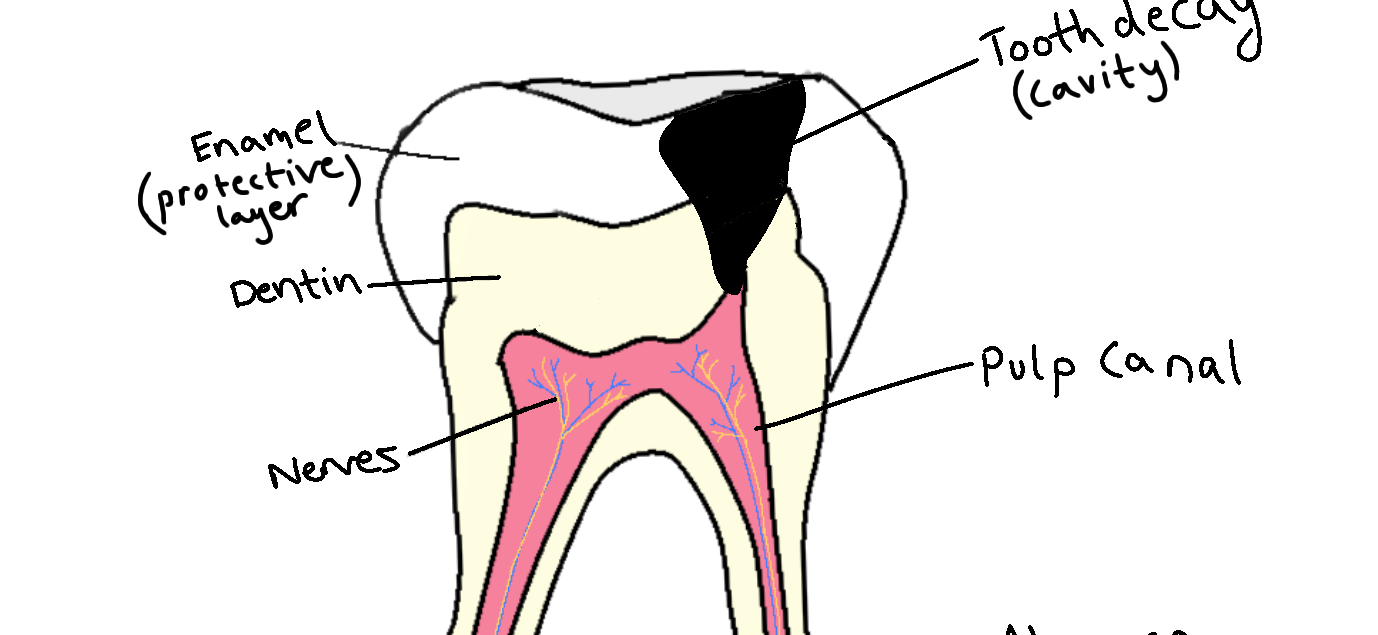The importance of oral hygiene by Mahnoor Usman
The importance of oral hygiene by Mahnoor Usman
Oral hygiene is a type of hygiene that is often overlooked, leading to many people not looking after their teeth until it is too late.
According to an article on cavities by the Centers for Disease Control and Prevention; 57% of adolescents have had a cavity in their permanent teeth. (Cavities, Centers for disease control and prevention, 2021)
These teeth need to last our entire lifetime so it is essential we look after them. Bad oral hygiene can cause a variety of unpleasant issues: Toothaches, cavities gum disease and even oral cancer, the most common being cavities.
But what are cavities?
Cavities are areas of the tooth that have been permanently damaged which leads to them forming holes. Initially they start by eroding the enamel (the protective outer surface of the tooth) and work their way towards the dentin (a softer, yellower inside section of the tooth) and eventually reach the pulp where all the nerves are. At this point the cavities cause immense pain and can only be treated by a dentist. This may require a root canal or even an extraction and unfortunately teeth don’t grow back, so how do we prevent this?
Most Dentists recommend you brush at least 2 times a day. This is because the mechanical movement of the brush against the teeth helps to remove any leftover food particles from the surface of the teeth which would otherwise be broken down by bacteria and converted to acid. This is what causes the erosion of the enamel. Fluoride, present in most brands of toothpaste, help to disrupt this bacteria since it is antimicrobial, helping to prevent cavities.
Although, not all surfaces of the tooth can be cleaned by just a brush. What about in-between the teeth?
This is why flossing is needed. The area of contact between the teeth is a common place to get cavities, especially on the molars due to their grooves and folds, because most people don’t know they have to clean between their teeth as well. Flossing involves a firm but gentle scrapping of the sides of the tooth. This can release any food remains stuck in-between the teeth. However, you shouldn’t be too aggressive with the floss as this could cause damage to the gums, causing gum recession (the same as brushing with too much force). (Why should I use dental floss? NHS website, 2019)
Chewing gum can also help to remove food particles as it involves a mechanical movement against the teeth. Just make sure the gum is sugar free, otherwise it may actually promote more cavities!
In addition to this sugar consumption is also a problem. Don’t be tempted by the desire to snack all day because the bacteria in your mouth like it even more than you do. In 2010, the WHO (World Health Organisation) commissioned a systematic literature review to answer a series of questions relating to the effects of sugars on dental caries. This showed consistent evidence of a relationship between the amount of sugar consumed and dental carries development. Therefore, the over consumption of sugar is proven to result in tooth decay.
Instead, try to have all your snacks at one time, then rinse your mouth with water and wait an hour before brushing to reduce the amount of time the food particles sit on your teeth.
Waiting an hour before brushing also helps to protect your enamel. After eating, the enamel is in a more vulnerable, weakened state and so can be easily broken down when brushing. Thus waiting an hour helps the enamel to remineralize itself, preventing breakdown during brushing. This is especially important after eating or drinking something acidic. While you wait, you should drink water to prevent your mouth from becoming dry. A dry mouth is more likely to develop cavities as saliva helps to remineralize the teeth and maintain the oral microbiome. (The Importance of Saliva for Oral Health – Top 5 Tips, Colgate, 2022)
Although the likelihood of getting cavities may be partly genetic, following a proper oral hygiene plan which includes brushing and flossing daily as well as reducing sugar consumption can significantly decrease your chances of getting cavities.
It will take a lot of effort to change these habits so I wish you well on your dental journey.
Smile on!
Centers for Disease Control and Prevention. (2021) Cavities. Available at: (https://www.cdc.gov/oralhealth/fast-facts/cavities/index.html#:~:text=Among%20adolescents%20aged%2012%20to,cavity%20in%20their%20permanent%20teeth.&text=Among%20adults%20aged%2020%20and,had%20at%20least%20one%20cavity.&text=1%20in%204%20adults%20aged,has%20at%20least%20one%20cavity.) (Accessed: 8 July 2023)
Colgate. (2022)The Importance of Saliva for Oral Health – Top 5 Tips. Available at: https://www.colgateprofessional.com.au/dentist-resources/advocates-for-oral-health/the-importance-of-saliva-for-oral-health# (Accessed: 8 July 2023)
NHS website. (2019) why should I use dental floss? (https://www.nhs.uk/common-health-questions/dental-health/why-should-i-use-dental-floss/ (Accessed: 8 July 2023

